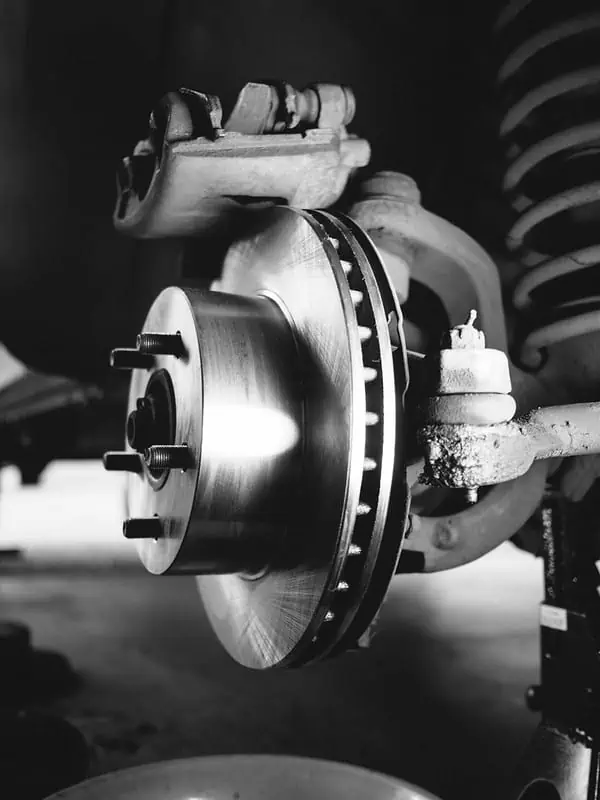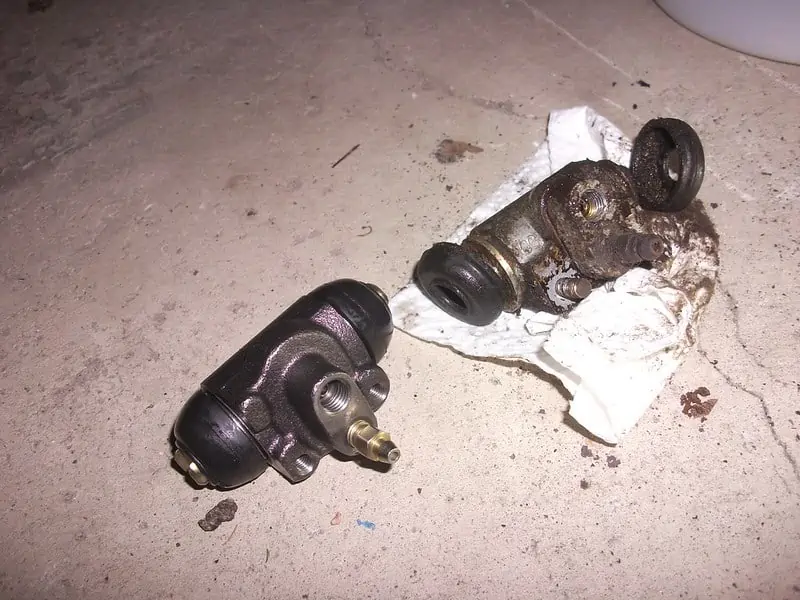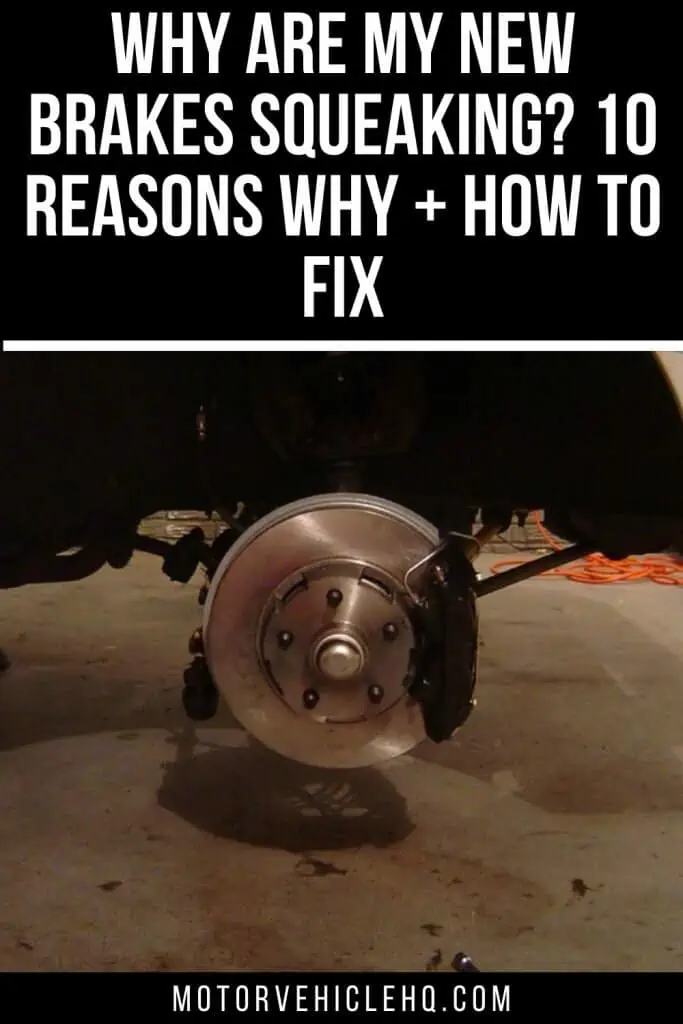Most people tend to believe that the cause of squeaking brakes is a result of worn-out brake pads. Although this is often the case, it is one of the most unlikely reasons new brakes make such high-pitched annoying sounds. Sometimes, temporary reasons like overnight moisture can cause new brakes to squeak, but there are certain situations where these sounds are warnings for something more serious.
On several occasions, these screeching noises make new brakes lose their braking strength significantly faster than usual. This increases the risk of road accidents to a worrisome degree and makes you spend money replacing the brake caliper or hydraulics just to rid your vehicle of the unpleasant sound.
Before getting to it, it is vital to know the two types of automotive braking systems.
Types of Brakes
There are two main types of braking systems – drum and disc brakes.
Drum Brakes
Drum Brake by Ivan Radic / CC BY 2.0
A drum braking system is a system enclosed in a cast-iron drum-like casing. When you press down the brake pedal of a vehicle with drum brakes, hydraulic fluid is sent to a wheel cylinder. In this wheel cylinder is contained two pistons that when triggered, push outwards and press against a brake shoe. A brake shoe consists of a curved metal piece with a friction material attached to a side. When the shoes and the inside of the drum meet, it creates friction. This slows the rotational movement of the wheel and in turn, the vehicle.
Drum brakes have gradually been eliminated from newer car models partly because they are more complicated, making them more susceptible to maintenance. They also produce more heat and this causes them to wear out faster.
However, some models still make use of them on the rear because they are less costly to produce.
Disc Brakes
Disc Brake by Ryan Frost / CC BY 2.0
The working principle of a disc braking system is quite similar to that of a drum. That is, pressing the brake pedal also sends hydraulic fluid to a piston, causing it to press down against a caliper. A caliper is a clam-shaped device that fits around a portion of the rotor and encloses the brake pads, which are similar to brake shoes.
The rotor is a metallic disc attached to the wheel that turns as the wheel does. When the pads press against the rotor, friction is generated; this, in turn, slows the rotation of the wheel. A lot of heat is generated during this process, which is why rotors have small holes drilled into them, to allow the heat to disperse.
This system is more costly to produce but less complicated than the drum system due to its fewer moving parts, making it easier to maintain. Also, many recent car models employ a disc braking system, because of the increased stopping power they provide.
Common Brake Noises and Possible Interpretations
There are three regular noises your vehicle can make when the brakes are applied, and they are:
A Grating Noise
Brake Pads by Dave Linger / CC BY-ND 2.0
Hearing a grating noise when the new brake of your car is applied means that you should get off the road and stop driving instantly. This is because the grating noise indicates the lack of brake pad material, and both the brake rotor and the brake pad are now making contact metal-to-metal. Although this is a lot more common with old brakes, there is no ruling out the possibility of it happening with your new brake.
A Clunking Noise from the Rear
Clunking noises from the rear are indicative of faulty drum brakes. Drum brakes work with friction when a set of pads press inside the middle of the metal drum. Although only present in some cars, its core purpose is to decelerate a moving vehicle till it comes to rest. If you happen to hear a thumping sound from the rear of your car when you hit the brakes, it is because the rear drum brakes have a loose return spring.
Squeaking Noises
Squeaky brakes can be very annoying to the occupants of a car when they go unattended for a long time. They are caused by several factors, some of which are easily rectified without engaging a professional.
Reasons why your New Brakes Squeak
Although there are dozens of reasons why your new brakes could make squeaking sounds, the most common ones include:
Dust between Your Pad and Rotor
Brake Rotor by Kyle Geib / CC BY 2.0
Dust between your brake pads and the rotors is more often than not, a dark-colored residue that appears due to the accumulation of friction materials from the brake pad and iron materials from the rotors overtime. This does not serve as an indicator for anything you should worry about. These accumulations of dust make your new brake squeak. To get rid of this dust residue, you will first want to ensure the brakes are cool to touch and not under direct sunlight or recently used so that you do not get hurt. You can then opt for a soapy solution or spray with a cleaner. This gets rid of the dust and, by extension, the squeaking.
Metallic Brake Pads
In some instances, your new brake pad is making squeaky sounds because of the kind of material the brake pad is made of. Three materials can be used to make brake pads; organic, semi-metallic, and ceramic.
Semi-metallic brake pads are the most common in the market. They are called semi-metallic brake pads because metallic elements such as iron, steel, graphite, and copper constitute about 30% – 65% of the pads.
When semi-metallic pads grate the rotor, it may cause squeaking or grinding noises in serious situations. With time, this high-pitched noise dies when the brake pad wears down.
If you find this noise unbearable, you can opt for a semi-metallic pad manufactured with less percentage of iron materials or switch to an organic or ceramic brake pad.
In terms of price, organic brake pads are the cheapest of the three but offer inferior quality and durability. On the other hand, ceramic brake pads are the quietest and most expensive; in return, they offer the highest durability and quality.
Overnight Moisture
If your vehicle stays outside overnight or is exposed to weather conditions – snow, rainfall, or morning dew – it stands a high chance of developing squeaking noises. This is because when moisture sets in on your brakes, it causes a layer of rust to form on the rotor hence the unpleasant sounds when the rotor comes in contact with the brake pad. Fortunately, if this is the case with your brake, the noise will vanish after a few abrupt stops while driving.
To prevent this from becoming the norm, always park your car in garages to prevent your brakes from accumulating moisture.
Fast Braking
Repeated fast braking when moving at high speed generates heat which smoothens the surface of your brake pad and lets out ear-splitting screeches. This heat can also repeatedly be generated when friction is created by using the brakes while moving downhill. In these scenarios, the brake pad tends to make squeaky noises as it comes in contact with the brake rotor.
When these continue over a long period, the friction between the pad and rotor glazes their surfaces, leading to a crack or fracture known as glazing.
If glazing becomes a repeated problem, you should change your braking style; if already glazed, you should get a professional to inspect the rotors for signs of damage. This professional will then decide if you need a resurfacing or replacement.
Lack of Lubrication on Drum Brakes
Squeaking may also be caused by insufficient lubrication between the shoes and drum brake. Without sufficient lubrication between the shoes and backing plate, they begin to scrape against one another, causing a squeaky noise. Repairing this problem is as easy as lubricating the backing plate with brake fluid.
Thankfully, brake grease is relatively cheap, ranging from roughly $5 to $32. If handled by professionals, labor costs could be between $80 to $130.
Improper Installation into Caliper Bracket
Caliper Brackets by Atomic Hot Links / CC BY-NC-ND 2.0
Sometimes, squeaking sounds could be a result of your mechanic fitting your brakes in the caliper bracket incorrectly. Other reasons could be because you have bought the wrong brake, the purchased brake pads are of extremely poor quality or the brake is installed by an amateur. All these make the new brake squeal.
To prevent these from happening, the auto parts store can help you with the brakes suited for your car. You should also seek the services of a professional; the average cost of labor for changing your brake is between $150 and $650, depending on what is wrong, what needs to be replaced and the vehicle in question: Both highly luxurious and heavy-duty vehicles tend to be on the high end (and sometimes exceed the proposed range).
Purchase of Some Brake Parts
To prevent an additional (and often unnecessary) repair cost, car owners tend to purchase the faulty parts of a brake instead of the brake system as a whole. Although this is sometimes for the best, failure to examine the brake parts thoroughly before deciding on the parts to buy can lead to missing out on the purchase of the defective part.
More often than not, an example of parts usually overlooked — when the car is examined by an amateur — is the brake rotor.
‘Warped rotor’ is a term that is used to describe worn-out rotors. Rotors need to withstand a lot of heat during the braking process and let this heat out as soon as possible so that braking is possible seconds later. As a result, the surface of a rotor becomes uneven over time, leading to warping. The effects of a warped rotor include squeaky sounds and temporary brake failures.
Although a warped rotor should be replaced, it can be straightened. Unfortunately, your rotor can still return to its defective form after a short period.
Presence of a Foreign Object
When foreign objects such as twigs, stones, and pinecones get stuck between the brake pad and brake rotor, squeaking sounds from your new brake become inevitable.
When this happens, it is advised that you take your car to a professional to help examine it. If you would rather not, you can drive in reverse for a few feet while turning your wheels to the left and right till the object falls out. If still stuck, you can proceed to take off the wheel and brake the caliper. Regardless of these tips, the best option is to seek the services of a professional.
Sticking Caliper or Wheel Cylinder
Brake Cylinders by Dave_7 / CC BY-SA 2.0
A sticking caliper or wheel cylinder occurs when the rotor disc is in contact with part of the brake caliper or when a stuck cylinder wheel continues to jam the brake shoe against the drum. In severe cases, it leads to grinding noises. Hence, it is advised that you call the attention of a professional before it gets to that stage.
Incorrect Adjustment or Missing Brake Hardware
If you have ever experienced a vibration often accompanied by annoying squeaking sounds on your new brake, there is the possibility that some brake components like the anti-rattle clips or anti-rattle shims are either missing or not correctly placed.
If this is the case, you should employ the services of a professional to inform you of the state of your braking system; to know if you need to have your brakes properly adjusted, or replace damaged or missing hardware like the caliper bracket or other parts.
Common Ways to Fix Squeaky Sounds
There is always the possibility of that annoying, high-pitched whine being present, even if your brakes are new. In these situations, there’s pretty much a limit to what you, the car owner, can do without seeking the attention of a professional. They are:
Greasing the Brake Pads
Keeping your brake pads lubricated is one of the easiest and most important things you can do to stop your new brakes from making squeaking sounds. Greasing should be done at every point in the braking system where parts slide, move, and come in contact with one another. Lubrication points include Caliper slides, pins, and so on. Luckily, you can purchase brake grease and do this on your own without seeking professional assistance.
Installing Brake Pad Shims
Brake Pad Shims by Ryan Gsell / CC BY 2.0
Depending on your vehicle, your brake pad might already have shims fitted to it. In situations where this is not the case, the installation of brake pad shims is another thing you can do to stop your new brakes from making squeaking sounds.
Most shims are self-adhesive, meaning the work is done as soon as you apply the shim to the back of the brake pad so that the piston makes contact with the middle of the shim. Shims work by taking up any space that will allow the brake pad to move around casually. They also have a small layer of rubber to absorb vibrations and prevent noise. The purchase of brake pad shims is usually in the range of $10 to $50.
Improving Your Braking Style
You can considerably reduce the need to abruptly step on your brakes except when necessary by paying close attention to your surroundings when driving. Also, keeping your two feet on the pedal increases the chances of tapping the brakes when not needed. Although this does not necessarily slow your car, it wears out your new brakes and often causes ear-screeching sounds.
Conclusion
Although it depends on your driving habits, your brake should last an average of 100,000 miles if you frequently drive on highways. Alternatively, you can find yourself opting for brake replacements after 15,000 miles if you drive within the city. Even if you do not use up to these numbers of miles, it is still advised that you have your brake checked yearly. A thorough brake job takes between one to two hours for completion. The average cost of significant brake jobs in the country can cost between $400 and $600.
If you notice strange sounds coming from your brakes, or a change in your brake’s performance, schedule a brake inspection with a reliable professional and have it checked out. Failure to check out your brake at the early stage can lead to more expensive repairs later on and road accidents in extreme cases.


Jim Wicks is the founder of MotorVehicleHQ. With over two decades of experience in the automotive industry and a degree in Automotive Technology, Jim is a certified car expert who has worked in various roles ranging from a mechanic, car dealership manager, to a racing car driver. He has owned more than 20 cars over the past 15 years. Ask him about any vehicle you see on the road and he can tell you the make, model and year. He loves the aesthetics of all things cars, and keeps his vehicles in pristine condition.
In his free time, Jim enjoys getting his hands dirty under the hood of a classic car or taking long drives along the country roads. His favorite car? A 1967 Shelby GT500, a true classic that, according to Jim, “represents the pure essence of American muscle.”







